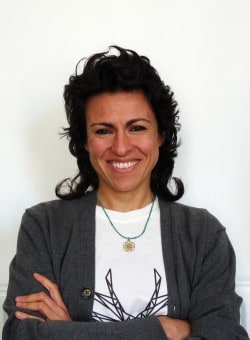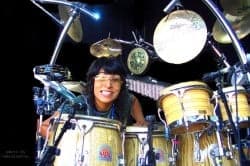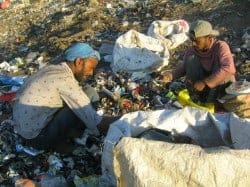Greenhouse Pioneer: Diana Simpson Hernandez, TRASH Surface Bureau

TRASH Surface Bureau is a London based waste material lab. It was founded by Diana Simpson Hernandez in 2013; the company collects local waste and transforms it into high end products and applications.
 Their processes are low energy and use eco-resins to manufacture waterproof and resilient products for lighting, furniture, bar tops, work surfaces, wall and floor tiles.
Their processes are low energy and use eco-resins to manufacture waterproof and resilient products for lighting, furniture, bar tops, work surfaces, wall and floor tiles.
Tell us about TRASH – what’s your mission?
At TRASH Surface Bureau we are making waste beautiful!
What motivates you?
I believe that the development of practical applications of waste derived materials is hugely important and it will highlight the real value waste has, contributing to the cultural shift we so desperately need in regards to how we view our rubbish.
Developing sustainable systems is no longer a choice but an impending necessity. We live in a world in crisis and we urgently need to create a cultural shift towards how we deal with our waste.
 What is your greatest achievement to date?
What is your greatest achievement to date?
My last project was to create over 60 SQM of bespoke products for a high end London hotel called The Library and this was a huge scaling up of the process. There was no room for error because the deadlines were incredibly tight, so it was not only technically challenging but also incredibly pressured. When I finished the pieces and they were all installed I had a huge sense of relief and satisfaction.
What work gets you excited?
We are currently working on developing new systems to scale up our production, which is incredibly exciting! I am also beginning to embark on the initial R&D to expand our waste derived materials, and this stage is definitely my favorite one, as it is very hands on and you get to really understand the qualities of a material.
Where do you want to take TRASH next?
Our mission at TRASH has always been about tackling as many waste streams as possible, and creating new business models for new waste derived materials is at the core of what we do. However, a very important part of our next steps will be to work with large corporations to help them find ways to create closed loop systems with their waste. We believe this is where our methodology will have an accelerated impact.
What can we, as individuals, do to make a difference?
I think that a huge part of our environmental issues today are a problem of perspective. We haven’t created long lasting cultural systems that can help us adapt to environmental challenges fast enough. Furthermore, as the real impact on our environment comes from large industry processes and manufacturing, only tough legislation could create meaningful changes. However, the pressure to create change fast can come from society itself. One of my favourite science fiction authors, Cory Doctorow, said: ‘Change the story people have imagined the future will be. Change that, and you change the future [:] just change the story we tell ourselves about the future and you change the future itself.’
If you were Prime Minister for a day, what would be the first thing you’d do?
Create water tight environmental laws that can’t be changed in the next term! I think a lot of the issues with policy and the environment are a result of politicians applying them only for their current terms. When the new administration comes along, some of these are scrapped, so whatever progress had been made is never as impactful as it could’ve been if allowed to develop fully.
What’s the coolest project you’ve come across?
One project that I find really inspiring and I am lucky enough to be working on too is SPARK, and this is a percussion shaker that creates clean energy through its use. It’s a really poetic project to bring clean energy to Africa, which is led by percussionist Sudha Kheterpal.
 We have been victims of a huge profit driven race which unfortunately has rendered products meaningless and disposable. Ourexperienceof objects has, as a consequence, become superficial and unsatisfying.
We have been victims of a huge profit driven race which unfortunately has rendered products meaningless and disposable. Ourexperienceof objects has, as a consequence, become superficial and unsatisfying.
Objects embody our culture: who we are and what we dream of.
Products can be really beautiful cultural representations, and I think we will see a lot more technology products trying to break free of the black box mold and use richer visual languages.
Can you recommend a life-changing book for our readers?
I can give a long list here as I have read some amazing and inspiring books but I would say Design for the Real World, by Viktor Papanek.
While studying Product Design at Central Saint Martins, this book helped me restructure my priorities and discover my purpose as a designer.
What do you listen to when you’re cooking dinner?
I love to relax when I am cooking, so I generally go for classical music, jazz or audiobooks! Having an audiobook in the background is a great way of relaxing too, whilst being told a great story!
What’s the best advice you’ve ever been given?
Start before you are ready: chances are you have everything you need to begin and the journey will be your teacher.
 Who’d be your Eco Hero?
Who’d be your Eco Hero?
There are so many amazing people doing really incredible things for the well-being of our planet, but I would like to mention the work of the ACORN Foundation which trains garbage pickers in India helping them in the handling, separation and recycling of waste materials. It also focuses on bringing respect to their labor and helping create a cultural shift on regards to their work and the importance of it in the overall harmony of society.
To find out more about TRASH visit their websiteand join the conversation on Twitter – follow@TrashSB


